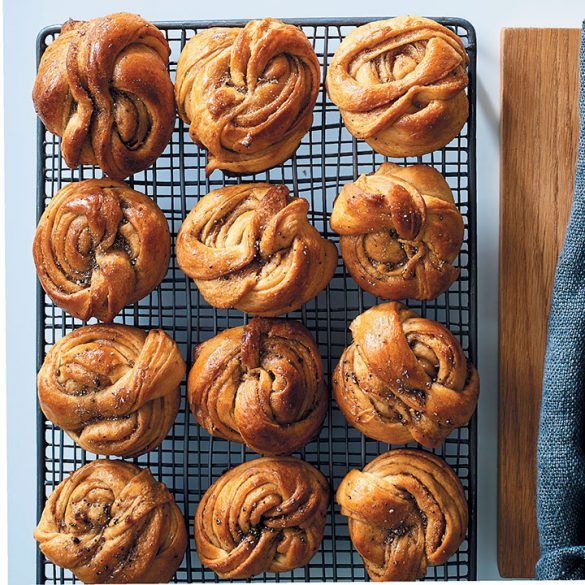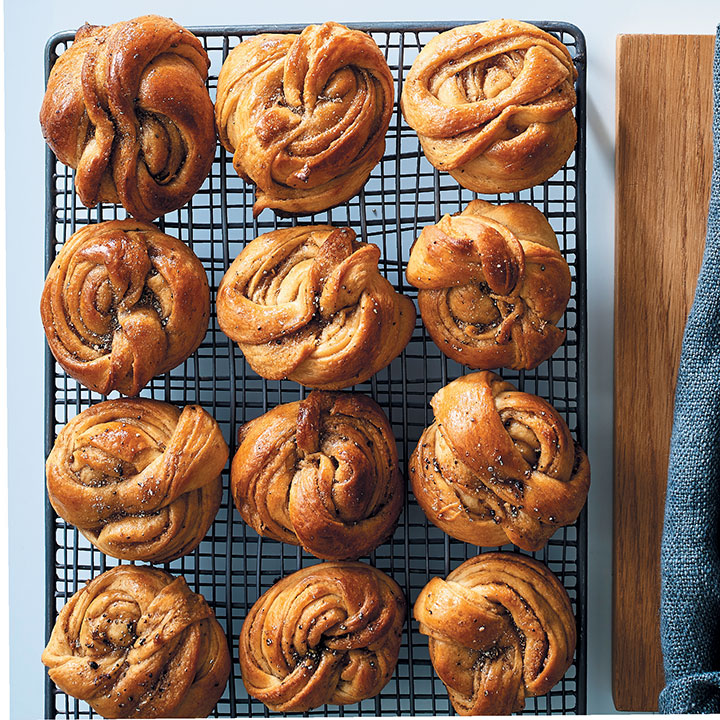These buns are less of a dessert but more suited to a rich breakfast, and are usually served with melted butter.

Ingredients
- DOUGH:
- 250ml (1 cup) milk, warmed
- 10g dried yeast
- 70g demerara sugar
- 500g cake flour + extra, to dust
- 2,5ml (½ tsp) salt
- 5ml (1 tsp) cardamom seeds, crushed to a coarse powder
- 80g butter, cubed and softened
- canola oil, to grease
- FILLING:
- 70g butter, softened
- 70g demerara sugar
- 5ml (1 tsp) cardamom seeds,
- crushed to a coarse powder
- GLAZE:
- 60ml (4 tbsp) water
- 60g castor sugar
- 5ml (1 tsp) vanilla essence
- 5ml (1 tsp) cardamom seeds, crushed to a coarse powder
- 15ml (1 tbsp) sugar
- soft butter, to spread
Instructions
1 Put the warm milk and yeast in a jug, and allow to rest, 10 minutes. Place the demerara sugar, cake flour, salt and coarsely crushed cardamom powder in the bowl of an electric stand mixer fitted with a dough hook – or in a large bowl, if kneading by hand. Whisk to combine all of the dry ingredients.
2 Add the milk mixture to the dry ingredients and knead with the dough hook or by hand, then increase the speed to medium, add the butter cubes in 3 batches and knead until the dough is smooth, soft and elastic, about 5 minutes in total – be careful not to over-knead.
3 Grease a large bowl with a little canola oil, then place your dough in the bowl and cover with a clean, damp tea towel to prove.
4 While the dough is proving, make the filling by placing 70g softened butter, the demerara sugar and the coarsely crushed cardamom powder in a bowl, and cream together.
5 Make the glaze by combining the water and castor sugar in a small pot. Bring to a boil over medium heat, without stirring, 1 minute, then remove from heat and stir in the vanilla essence. Set aside until needed.
6 Line 2 large baking sheets with baking paper (using a few dabs water to stick down the baking paper) or silicone mats and set aside. On a lightly flour-dusted surface, roll out the dough to a rectangle of 55cm x 34cm. Spread the buttery filling on the dough rectangle with a spatula, so that the rectangle is covered entirely by the filling.
7 Rotate the rectangle so that one of the long edges is lying closest to you on the counter. Mentally divide the dough into 3 equal parts along its length. Fold the left third to the middle, then fold the right third over the left third, so that the dough is folded into 3 layers that create a rectangle. Rotate the dough, so that the openings are facing left and right, then roll out the dough slightly.
8 Using a sharp knife, cut 2cm strands along the short length of the dough. You should have 15 – 20 strands. Pick up one of the strands, wrap it around the tips of your thumb and four fingers twice, twisting slightly as you wrap to stretch the dough, then slip your thumb out of the roll, loop the strand around one last time then tuck the end and your thumb loop into the bottom. Repeat this step with all the strands so that they have been transformed into little dough knots.
9 Place the knotted buns on your prepared baking sheets, leaving a 2cm-wide space open between each bun, and cover with a clean, damp tea towel. Allow to rise, 30 minutes.
10 While the knotted buns are proving, preheat the oven to 230°C. Once proved, bake the rolls, 7 – 10 minutes. While baking, reheat the glaze until warm. Remove the buns from the oven and while still hot, brush the tops with the glaze, then sprinkle with the coarsely crushed cardamom powder and sugar. Serve warm with soft butter for spreading.
Recipe shared by Food&Home.
ALSO SEE:
Feature Image: F&H

